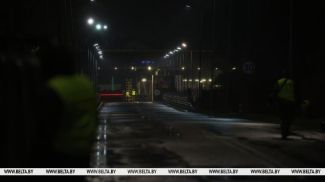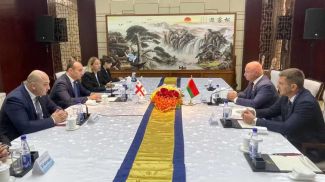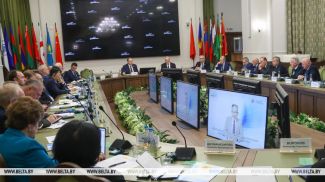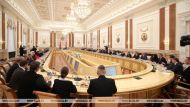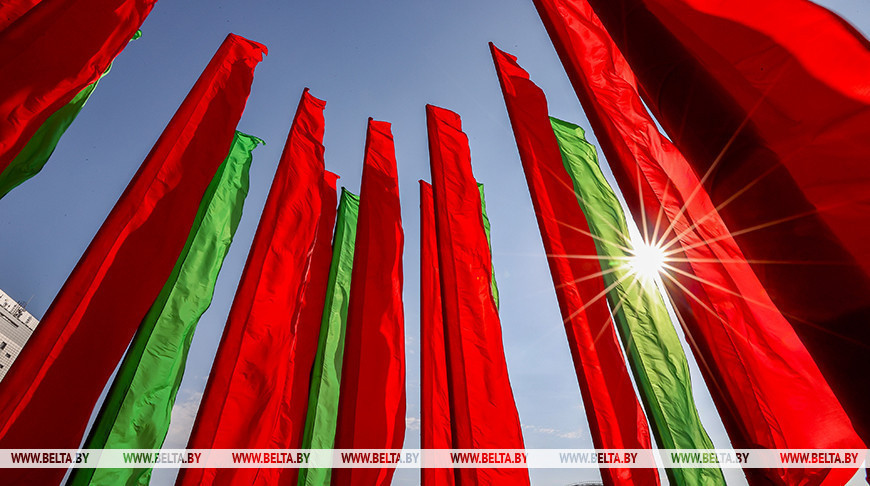
MINSK, 22 January (BelTA) – In the run-up to the presidential election in Belarus the International Institute for Middle East and Balkan Studies (IFIMES, Slovenia) issued a report analyzing the activities of the head of state Aleksandr Lukashenko during his time in power, BelTA learned.
“Independent analysts believe that the current president of Belarus has achieved several accomplishments during his tenure,” IFIMES said.
The most significant of which include, according to the institute, promoting economic stability and improving citizens' quality of life, developing key industrial sectors and strengthening the export sector, expanding the country’s infrastructure through the construction of roads and bridges.
One of Lukashenko's main achievements in rural development was the project to create agro-towns. Accordign to IFIMES, between 2005 and 2010, the government implemented a rural housing program, establishing approximately 1,500 agricultural towns and constructing around 8,000 housing units.
IFIMES experts also took note of the progress in the fields of science and technology.
In his first term, Aleksandr Lukashenko’s primary focus was to rescue the country from economic collapse, the report reads.
“In his first term, Alexander Lukashenko introduced rapid measures to stabilise the economy. These included doubling the minimum wage, imposing price controls, and rolling back several economic reforms implemented by his predecessors. His primary focus during this period was fulfilling his central campaign promise: to rescue the country from economic collapse. Lukashenko faced the significant challenge of revitalising a communist-era economy in a nation of approximately 10 million people. Belarus was heavily dependent on gas and electricity imports from Russia, purchased at subsidised rates. The lack of financial resources to pay for Russian imports made economic cooperation with Russia even more essential for Belarus,” the IFIMES report says. The main priority of Lukashenko's second presidential term was the development of the country based on accelerated social and economic growth. As a result, Belarus became the first post-Soviet nation to overcome economic devastation.
“In the 2006 elections, Aleksandr Lukashenko secured a third term with 83% of the vote. Over the next five years, he prioritised economic development aimed at improving citizens’ quality of life and combating bureaucracy, which contributed to Belarus becoming a more socially developed country overall,” the report says.
In the next years, Belarus focused on modernization and adoption of advanced technical equipment, digitalization of the economy, development of nuclear energy and implementation of major investment projects in various sectors. The country also took part in the Eurasian integration projects and managed regional crises.
In recent years, Belarus has been under severe pressure from Western countries. Most Western sanctions imposed on Belarus, particularly following Russia’s intervention in Ukraine, stem from its political and economic ties to Russia, the IFIMES analysts believe.
The analysts note that observing the war in Ukraine, one can see the wisdom of Belarusian leadership in striving to ensure Belarus would not share Ukraine’s fate. “They [the Belarusian authorities] preserved peace during the most difficult moments, despite facing extensive Western sanctions and even some retaliatory measures from Russia,” the report summarizes.
“Independent analysts believe that the current president of Belarus has achieved several accomplishments during his tenure,” IFIMES said.
The most significant of which include, according to the institute, promoting economic stability and improving citizens' quality of life, developing key industrial sectors and strengthening the export sector, expanding the country’s infrastructure through the construction of roads and bridges.
One of Lukashenko's main achievements in rural development was the project to create agro-towns. Accordign to IFIMES, between 2005 and 2010, the government implemented a rural housing program, establishing approximately 1,500 agricultural towns and constructing around 8,000 housing units.
IFIMES experts also took note of the progress in the fields of science and technology.
In his first term, Aleksandr Lukashenko’s primary focus was to rescue the country from economic collapse, the report reads.
“In his first term, Alexander Lukashenko introduced rapid measures to stabilise the economy. These included doubling the minimum wage, imposing price controls, and rolling back several economic reforms implemented by his predecessors. His primary focus during this period was fulfilling his central campaign promise: to rescue the country from economic collapse. Lukashenko faced the significant challenge of revitalising a communist-era economy in a nation of approximately 10 million people. Belarus was heavily dependent on gas and electricity imports from Russia, purchased at subsidised rates. The lack of financial resources to pay for Russian imports made economic cooperation with Russia even more essential for Belarus,” the IFIMES report says. The main priority of Lukashenko's second presidential term was the development of the country based on accelerated social and economic growth. As a result, Belarus became the first post-Soviet nation to overcome economic devastation.
“In the 2006 elections, Aleksandr Lukashenko secured a third term with 83% of the vote. Over the next five years, he prioritised economic development aimed at improving citizens’ quality of life and combating bureaucracy, which contributed to Belarus becoming a more socially developed country overall,” the report says.
In the next years, Belarus focused on modernization and adoption of advanced technical equipment, digitalization of the economy, development of nuclear energy and implementation of major investment projects in various sectors. The country also took part in the Eurasian integration projects and managed regional crises.
In recent years, Belarus has been under severe pressure from Western countries. Most Western sanctions imposed on Belarus, particularly following Russia’s intervention in Ukraine, stem from its political and economic ties to Russia, the IFIMES analysts believe.
The analysts note that observing the war in Ukraine, one can see the wisdom of Belarusian leadership in striving to ensure Belarus would not share Ukraine’s fate. “They [the Belarusian authorities] preserved peace during the most difficult moments, despite facing extensive Western sanctions and even some retaliatory measures from Russia,” the report summarizes.




